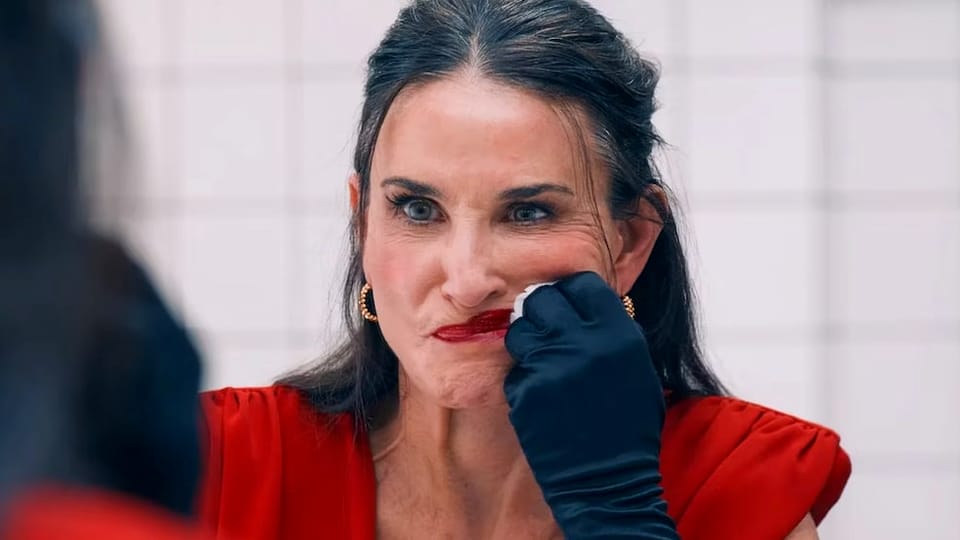The Substance, as reviewed by an old broad

I never had to worry about losing my looks.
Or rather, I never had looks to lose. I’m not beautiful now, and I wasn’t beautiful in my youth. I was cute at best, and now in middle age I have the plain, strong-jawed look of a 19th-century farmwife. I’m not breaking hearts but I can bake a good pie.
It’s okay, there’s not much I can do about it now. When I think about my encroaching decrepitude, I think of it more in terms of time than its effect on me. It’s not that I miss the person I physically was in my 20s (unwrinkled, pain-free back, able to drink middle-aged me under the table), but rather feeling like I had a whole lifetime ahead of me, instead of worrying that it’s in my rearview mirror. It’s not quite the same as being a beautiful woman watching that beauty slowly fade away.
But I do know what it feels like to disappear.
When you’re a woman of a certain age (maybe 35, if not younger), you start getting the message, both subtly and unsubtly, that your value is quickly decreasing. You start seeing ads for Botox, liposuction, and “foundation garments,” because now that you’re getting older your metabolism is slowing down and ugly belly fat is harder to lose. Fashion tips become a little less playful and more critical: time to let the miniskirts go, ladies. No more jeans and t-shirts, those are for the kids. Have you considered a pantsuit, they’re flattering on all mature body types, and can be worn both for daytime and evening events1. Leave the punky hair color to the girlies, but also don’t let it go gray, that prematurely ages you. Here’s an exercise routine to get rid of that half-inch of extra flesh on your upper arms, and if that doesn’t work, removing it has become the hot new cosmetic surgery procedure for everyone from Kim Kardashian to Doja Cat.
The older you get as a woman, the more you get the sense that the world is trying to hide you away like a winter coat. We are reminded that men are biologically attracted to young women because they stimulate their urge to procreate, while women their age just remind them of their mothers or sisters, I guess. We are told that men are not interested in women over 40, let alone over 50, because of a largely false perception that we no longer want sex, but when we do that’s perceived as desperate, sad, and, frankly, a little gross. Men age like fine wine, women like milk. The current Republican Vice-Presidential candidate believes that once a woman is past childbirthing age the only thing she’s good for is taking care of other people’s children. A lot of people agree with him.
We get the message, loud and clear: if men don’t want to fuck us, we don’t mean shit to them. Coralie Fargeat’s The Substance is a beautifully grotesque, furious response to that.
Because I was never a beautiful woman I shouldn’t have found the story of a gorgeous actress who finds her value as a person taken away in an instant so relatable. And yet, there I was, at the end of the movie, stunned, laughing in disbelief at what I had just seen, and yet overwhelmed with emotion at the same time. That’s cinema, baby.
Demi Moore, in the performance of the year that should be remembered at awards season (but won’t, because we know how the Academy feels about horror, it makes a lot of money but ugh), is Elisabeth Sparkle, a former movie star turned celebrity fitness host. Elisabeth has had a long, successful run on her show, but she’s turning 50, an event that her loathsome producer, Harvey (a shockingly good Dennis Quaid), views with nothing short of disgust. After all her years of service to the network, Elisabeth is fired, with little more than a bouquet and a cookbook for her trouble.
After a distraught Elisabeth is in a car accident, an eerily handsome nurse refers her to a mysterious product called The Substance, which appears to be sold out of a PO box hidden within an abandoned building, and the only “customer service” offered is a curt male voice over the phone. The Substance (which, all too appropriately, looks like the glowing green fluid Dr. Herbert West invented to revive the dead in Re-Animator) is the first step in a process that promises “a better version of yourself,” one that is “younger, more beautiful, more perfect.” It’s a fairly brutal process involving a series of injections (although, to be fair, so does Botox), and certain rules must be carefully followed, most importantly that you’re only allowed to be this better version for seven days at a time, before switching back to yourself for another seven days.
There’s no explanation as to what happens if you don’t follow the rules. Elisabeth proceeds anyway, and births her better version out of her back, a younger woman (played by Margaret Qualley) who, like the nurse, is so beautiful she doesn’t seem quite human. Interestingly (and poignantly), Elisabeth’s better version of herself has different colored eyes, larger breasts, and paler skin, as if to suggest that she found her real younger self flawed and “not enough” too. Now she’s perfect.

The younger version, calling herself Sue, applies for Elisabeth’s old job, and Harvey, like very nearly every other man Sue encounters, becomes a Tex Avery character in her presence. She gets the job and is an overnight success, hosting a show that is less an exercise program and more a challenge to see how many close-ups of her ass the camera can capture per minute. Embracing her new lease on life, Sue becomes an exaggerated, almost cartoonish take on femininity, innocent but still sexy, with a wardrobe of fluorescent-colored booty shorts and crop tops. Wanting to be as appealing to men as possible, she does little more than giggle and smile, and says almost nothing about herself. Sue doesn’t even have a last name, let alone a background or any real internal life.
Though they share the same conscience, Elisabeth and Sue almost immediately find themselves at odds with each other. Elisabeth is infuriated at how quickly she’s replaced, while Sue is disgusted that when it’s Elisabeth’s turn to exist for seven days, she does little more than mope around her apartment and eat. Though the voice behind The Substance (perhaps it’s The Substance itself) warns them both numerous times that they’re the same person existing in two separate bodies, and that “the balance must be respected,” Sue begins borrowing time against Elisabeth, to what are eventually horrifying results.
Listen. I’m not saying I would inject myself with a syringe full of what looks like glow stick juice. But the idea of borrowing time from myself to be a better version of me for a little while is extremely tempting. Less crow’s feet. Ankles a little thinner. Ass a little tighter. Tits a little higher. Kidneys working to full capacity. It’d be nice, and if the price I paid in my regular self was another wrinkle or two, I guess I could live with that. But the lure to keep borrowing more time will become stronger, and harder to resist, and then before you know it I’ve become a hulking mass of gnarled flesh, with everything in the wrong place, a freak and a nightmare.
The Substance is not a subtle movie. For one thing, the primary villain is a Hollywood producer named Harvey. He’s shot in a wildly unflattering fish-eye angle, as if to suggest that he’s looking at Elisabeth and Sue like someone looking at.a bug through a magnifying glass. But perhaps the anger women feel about only being valued for their youth and good looks shouldn’t be subtle. Maybe it should hit like a hammer right between the eyes, because lord knows no one seems to be getting the message that it’s dispiriting for a woman to be reminded over and over that she’s not enough.
One of the few negative reviews of The Substance, by Emmy Gould at The Cut, complained that the film’s message loses its impact because Demi Moore is too attractive and well-aged (indeed, she’s 60 playing 50) to be relatable as a woman falling apart over losing her looks. But let’s not forget: back in the 90s, Demi Moore was once the highest-paid actress in the world, and known for her killer bod, but has found her star waning over the years. Why? Because she’s old. She was considered old by Hollywood standards twenty years ago. Her naked body is frequently on display here, and while she still looks amazing (for any age, let alone 60), she still looks just a little less good than co-star Margaret Qualley. It’s a zero-sum game: if she got a Brazilian butt lift to emulate Qualley’s fit but curvy body, she’d look desperate. If she just let herself age naturally, she’ll have given up. That’s the point of The Substance: if Demi Moore is considered “too old,” what hope do the rest of us ordinary she-shlubs have?
Though the finale of the film goes to extraordinarily gruesome places (so gruesome that all you can do is laugh and cringe at the same time), its most haunting and painful moments are the quieter ones, like when Elisabeth, while getting ready for a date with an old classmate, becomes so dissatisfied with her appearance that she furiously rubs at her face like she’s hoping it’ll come off in her hands. Or how the tone of Elisabeth’s obnoxious male neighbor’s voice immediately changes from hostile to soft and charming when he discovers that Sue has replaced her. A lot of men change their voice according to how attractive they find a woman. You have to have talked to a lot of them to notice it, but it’s there. When they’re not attracted to you, there’s a polite distance at best, though the less attractive you are, the less polite it gets, until they just stop acknowledging you altogether.
Undoubtedly many people will come away from The Substance grumbling that what happens to Elisabeth at the end (and you really must see it for yourself, because you wouldn’t believe me if I told you) is hardly worth a few fleeting months of being young and beautiful again. I mean, sure, obviously. Presumably that’s why there’s never any specific explanation of what happens if you don’t follow the steps of The Substance, other than vague warnings about maintaining the balance, otherwise no one would ever do it. But maybe they would. Like with any drug, no one ever goes into trying it with the intent of developing an addiction. I’ll be safe. I’ll be careful. I’ll know when to stop. But maybe you won’t, especially when there’s no more powerful drug than wanting to be seen, and needing to be loved.
Thanks for reading Gena Radcliffe Watches Things! Subscribe for free to receive new posts and support my work.
Just know that if you ever see me in a pantsuit, it’ll be because I have died and someone else picked out my burial outfit (and I will haunt them for it) ↩
Member discussion